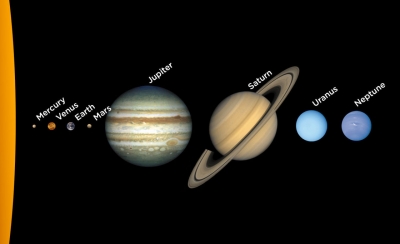
You wouldn’t be able to walk on Jupiter, Saturn, Uranus or Neptune because they have no solid surface!
The strength of the gravitational field of the body also plays a role: too weak a gravitational field rules out walking, in the sense of taking strides. We know what walking was like on the Moon. It was funny-looking, but definitely walking. But our Moon, with only 1/6 Earth’s surface gravity, has the strongest surface gravity among the other moons of the Solar System. (Our Moon is composed mostly of rock, while all the other moons are primarily ices, and therefore much less dense.) With a weaker gravity, walking would be even stranger, and slower, but at some point, nothing like steps could happen. Where to draw the line? What is meant by “walking”? With 1/10 of our Moon’s gravity, is it walking?
The surface gravity of a body depends on both its mass and on its radius: it is proportional to the mass divided by the square of the radius. Thus, a smaller body of denser material may have a higher surface gravity than one of lighter material.
On most asteroids and smaller moons, the gravity is just too low—it wouldn’t be walking. Some medium-sized moons may be border cases though.
Picture Credit : Google

